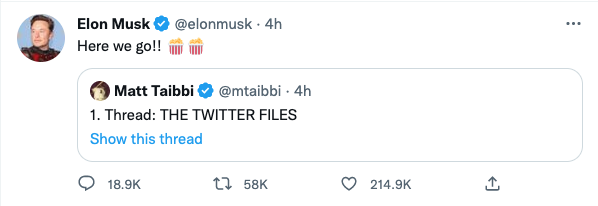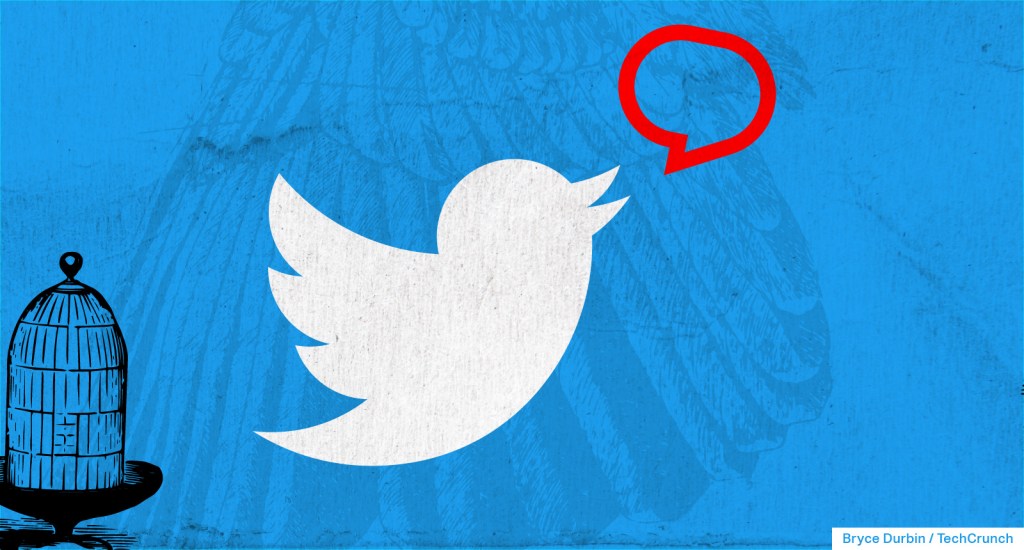Elon Musk reminded his followers on Friday that owning Twitter now means he controls every aspect of the company — including what its employees said behind closed doors before he took over.
Earlier this week, Musk teased the release of what he called “The Twitter Files,” declaring that the public “deserves to know what really happened” behind the scenes during Twitter’s decision to stifle a story about Hunter Biden back in 2020.
On Friday evening, Musk delivered, sort of. Twitter’s new owner shared a thread from author and Substack writer Matt Taibbi who is apparently now in possession of the trove of internal documents, which he opted to painstakingly share one tweet at a time, in narrative form.
Taibbi noted on his Substack that he had to “agree to certain conditions” in order to land the story, though he declined to elaborate about what the conditions were. (We’d suspect that sharing the documents in tweet form to boost the platform’s engagement must have been on the list.)

Taibbi’s decision to reveal a selection of the documents one tweet at a time was apparently not painstaking enough. One screenshot, now deleted, published Jack Dorsey’s private personal email address. Another shared an unredacted personal email belonging to Rep. Ro Khanna (D-CA), who expressed concerns about Twitter’s action at the time. Both incidents appear to run afoul of Twitter’s anti-doxing policy.
The documents, which are mostly internal Twitter emails, depict the chaotic situation that led Twitter to censor a New York Post story about Hunter Biden two years ago. In October 2020, The New York Post published a story that cited materials purportedly obtained from a laptop that the younger Biden left at a repair shop. With a presidential election around the corner and 2016’s hacked DNC emails and other Russian election meddling fresh in mind, Twitter decided to limit the story’s reach.
In conversation with members of Twitter’s comms and policy teams, Twitter’s former Head of Trust and Safety Yoel Roth cited the company’s rules about hacked materials and noted the “severe risks and lessons of 2016” that influenced the decision making.
One member of Twitter’s legal team wrote that it was “reasonable” for Twitter to assume that the documents came from a hack, adding that “caution is warranted.” “We simply need more information,” he wrote.
In his Twitter thread, Taibbi characterized the situation to make such a consequential enforcement decision without consulting the company’s CEO as unusual. In reality, then-CEO Jack Dorsey was well known for being hands-off at the company, at times working remotely from a private island in the South Pacific and delegating even high-profile decisions to his policy team.
After Twitter acted, the response from outside the company was swift — and included one Democrat, apparently. “… In the heat of a Presidential campaign, restricting dissemination of newspaper articles (even if NY Post is far right) seems like it will invite more backlash than it will do good,” Khanna wrote to a member of Twitter’s policy team.
At the time, Facebook took similar measures. But Twitter was alone in its unprecedented decision to block links to the story, ultimately inciting a firestorm of criticism that the website was putting a thumb on the scale for Democrats. The company, its former CEO and some policy executives have since described the incident as a mistake made out of an overabundance of caution — a story that checks out in light of the newly published emails.
Musk and Taibbi’s files also reveal that the Biden campaign asked Twitter to review and remove a series of tweets in October 2020 and in at least once instance Twitter complied. While some Twitter users cried foul about the situation, which occurred while Trump was still in office, archives of those tweets reveal that they contained leaked nude images of Hunter Biden. Twitter has long had a policy against non-consensual nudity and allows anyone to report “unauthorized, intimate content of me or someone else.” The company expanded those rules in 2017 to better serve victims.
https://twitter.com/TwitterSafety/status/923958327280779264?ref_src=twsrc%5Etfw%7Ctwcamp%5Etweetembed%7Ctwterm%5E923958327280779264%7Ctwgr%5Ed98c9f665c84613994c19c39d0b9a92fb7b74d96%7Ctwcon%5Es1_&ref_url=https%3A%2F%2Fmashable.com%2Farticle%2Ftwitter-revenge-porn
Musk hyped the release of the emails as a smoking gun, but they mostly tell us what we already knew: that Twitter, fearful of a repeat of 2016, took an unusual moderation step when it probably should have provided context and let the story circulate. Musk has apparently stewed over the issue since at least April when he called the decision to suspend the Post’s account “incredibly inappropriate.”
Files from the laptop would later be verified by other news outlets, but in the story’s early days no one was able to corroborate that the documents were real and not manipulated, including social platforms. “Most of the data obtained by The Post lacks cryptographic features that would help experts make a reliable determination of authenticity, especially in a case where the original computer and its hard drive are not available for forensic examination,” The Washington Post wrote in its own story verifying the emails. The decision inspired Twitter to change its rules around sharing hacked materials.
Twitter’s former Head of Trust and Safety Yoel Roth shared more insight about the decision in an interview earlier this week, noting that the story set off “alarm bells” signaling that it might be a hack and leak campaign by Russian group APT28, also known as Fancy Bear. “Ultimately for me, it didn’t reach a place where I was comfortable removing this content from Twitter,” Roth said.
Dorsey admitted fault at the time in a roundabout way. “Straight blocking of URLs was wrong, and we updated our policy and enforcement to fix,” Dorsey tweeted. “Our goal is to attempt to add context,” he said, adding that now the company could do that by labeling hacked materials.
Musk has been preoccupied with a handful of specific content moderation decisions since before deciding to buy the company. His frustration that Twitter suspended the conservative satire site The Babylon Bee over a transphobic tweet appears to be the reason he even decided to buy Twitter to begin with.
Now two years after it happened, the Hunter Biden social media controversy is still a sore spot for conservatives, right wing media and Twitter’s new ownership. The platform’s past policy controversies are mostly irrelevant now with Musk at the wheel, but he apparently still has an axe to grind with the Twitter of yore — and we’re seeing that unfold in real(ish) time.
Twitter is now allowing users to share that controversial New York Post story































Comment